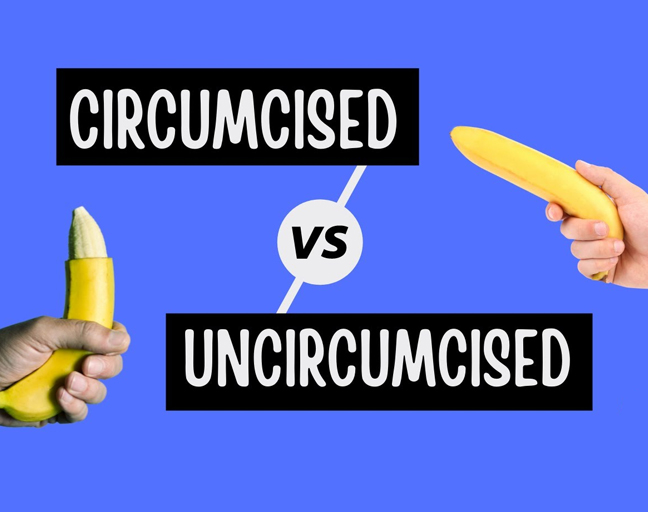For generations, circumcising male infants has been the norm in many cultures around the world. Whether it’s a religious ritual, a health decision, or a personal choice, the procedure has been performed in hospitals or during private ceremonies. However, in recent years, fewer families are automatically choosing circumcision for their sons. More parents are questioning whether the procedure is truly necessary. So, what’s the verdict? Is circumcision really better, or should we be leaving things as they are? Let’s take a closer look at both sides of the debate.
Circumcised vs. Uncircumcised: What’s the Difference?
Making the decision to circumcise is a big deal. If you’re still on the fence, understanding the key differences between circumcised and uncircumcised penises can help you make an informed choice.
1. Structure
The most obvious difference between the two is visible at the tip of the penis. At birth, boys have a foreskin covering the head of the penis, similar to the skin on their eyelids. If this foreskin is removed, the penis is circumcised, otherwise, it remains uncircumcised.
2. Health Benefits
There’s a reason many opt for circumcision—it can offer significant health advantages. Studies show that uncircumcised males face higher risks for a variety of health conditions compared to their circumcised counterparts:
- Urinary tract infections (UTIs): Uncircumcised infants have more than 12 times the risk of developing UTIs, a trend that continues into adulthood. Around 1 in 3 uncircumcised men experience UTIs over their lifetime, compared to just 1 in 20 circumcised men.
- Penile infections and inflammation: Uncircumcised men are at a greater risk of developing infections like balanitis, posthitis, and balanoposthitis (inflammation of the glans and foreskin). Additionally, uncircumcised boys are more likely to experience phimosis (inability to retract the foreskin) and paraphimosis (painful constriction of the foreskin). These conditions affect up to 18% of uncircumcised boys by age eight, whereas circumcision significantly reduces these risks.
- Penile cancer: While rare, penile cancer is more than 20 times more common in uncircumcised men. Though the overall risk is low, this type of cancer is severe, with a quarter of patients dying from it, and many others needing some form of amputation.
- Sexually transmitted infections (STIs): Uncircumcised men are more likely to contract STIs, such as genital herpes, HPV, and syphilis. The risks are even higher for their female partners, who have up to five times more likelihood of contracting infections like bacterial vaginosis or HPV.
- HIV and prostate cancer: The risk of contracting HIV is significantly higher for uncircumcised men (2-8 times more likely). Additionally, uncircumcised men have a 50-100% higher chance of developing prostate cancer.
3. Sexual Health and Sensation
Another area of concern for many men is how circumcision might affect sexual pleasure. There are different opinions on this, but here’s what you need to know:
- Sensitivity: Since circumcision removes part of the skin from the penis, many men report a decrease in sensitivity. The fine touch receptors that are responsible for pleasure are removed, and the remaining skin hardens to protect the area. For some men, this can result in reduced sexual sensation over time.
- Pleasure: Studies on how circumcision affects a woman’s sexual pleasure are mixed. While some research suggests women with circumcised partners are more satisfied, other studies find no difference. However, one potential benefit for women with uncircumcised partners is the increased friction created when the foreskin retracts during intercourse, which can enhance clitoral stimulation.
- Pain: For some women, sex with a circumcised partner can be painful, as the exposed head of the penis can be rougher or cause discomfort. On the other hand, uncircumcised men might have a smoother experience, which could be more comfortable, particularly for women who don’t produce enough natural lubrication. However, an uncircumcised man may experience pain if his foreskin becomes stuck or if phimosis occurs.
Is Circumcision Necessary?
The question of whether circumcision is truly necessary is still up for debate. Some medical organizations, like the American Academy of Pediatrics (AAP), acknowledge that there are medical benefits to circumcision, such as a reduced risk of infections and certain cancers. However, they don’t recommend it universally for newborns, leaving it up to parents to decide whether the procedure is right for their son based on health, cultural, or personal reasons.
Before making the decision, it’s important to consult with a healthcare professional about the pros and cons. Keep in mind that cultural, religious, and personal preferences will likely play a significant role in your decision-making process. Remember, you’re making a decision for your son, so it’s essential to think about what will be best for him in both the short and long term.
In the end, whether you choose circumcision or not, it’s a deeply personal choice. Understanding the potential health benefits, risks, and sexual implications will help you make the best decision for you and your family.


Leave a Reply